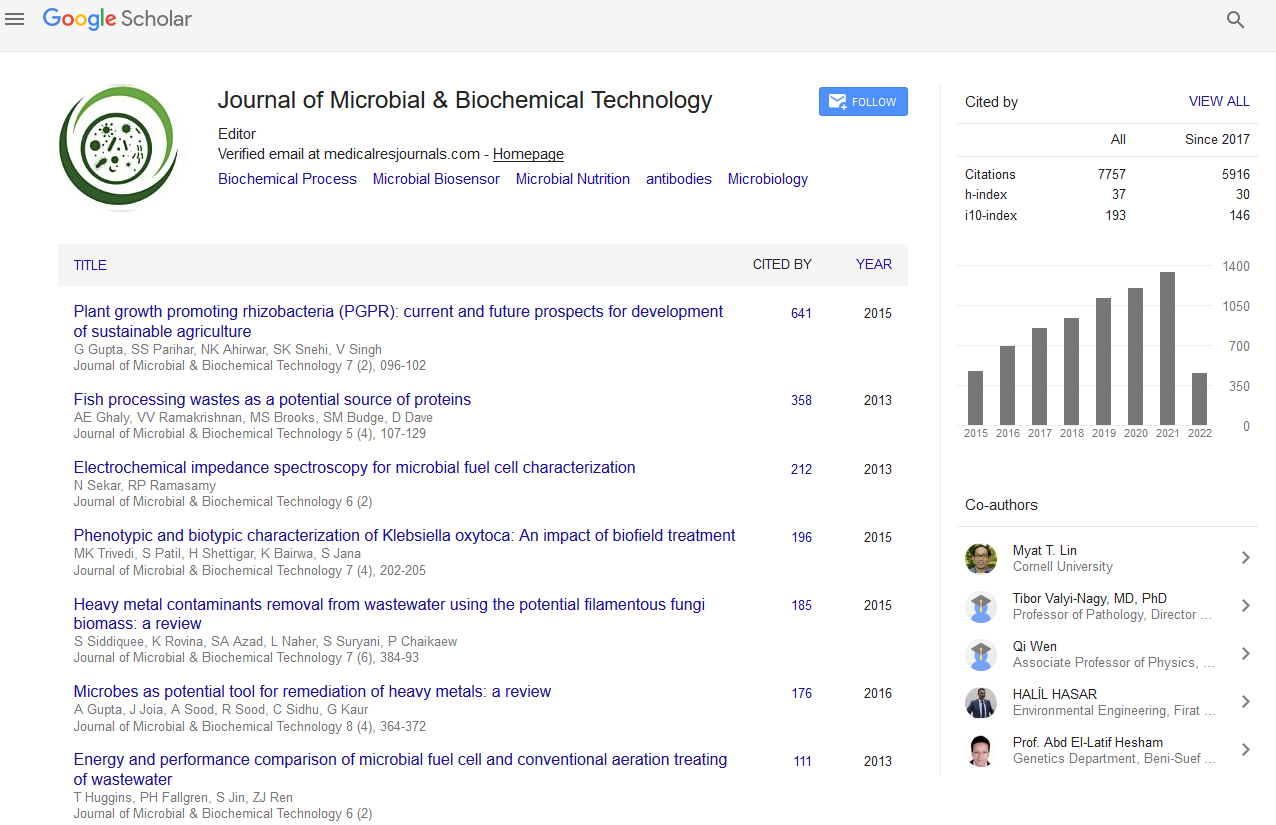PMC/PubMed Indexed Articles
Indexed In
- Academic Journals Database
- Genamics JournalSeek
- Academic Keys
- JournalTOCs
- China National Knowledge Infrastructure (CNKI)
- Scimago
- Access to Global Online Research in Agriculture (AGORA)
- Electronic Journals Library
- RefSeek
- Directory of Research Journal Indexing (DRJI)
- Hamdard University
- EBSCO A-Z
- OCLC- WorldCat
- SWB online catalog
- Virtual Library of Biology (vifabio)
- Publons
- MIAR
- University Grants Commission
- Geneva Foundation for Medical Education and Research
- Euro Pub
- Google Scholar
Useful Links
Share This Page
Journal Flyer

Open Access Journals
- Agri and Aquaculture
- Biochemistry
- Bioinformatics & Systems Biology
- Business & Management
- Chemistry
- Clinical Sciences
- Engineering
- Food & Nutrition
- General Science
- Genetics & Molecular Biology
- Immunology & Microbiology
- Medical Sciences
- Neuroscience & Psychology
- Nursing & Health Care
- Pharmaceutical Sciences
Endophytes diversity of medicinal plants and the discovery of their HIV activity
16th International Pharmaceutical Microbiology and Biotechnology Conference
May 21-22, 2018 | Vienna, Austria
Fang Xiao Mei, Jing Su, Hong Yu Liu, Ma Bai Ping, Zhang Yu Qin and Yu Li Yan
Institute of Medicinal Biotechnology, Chinese Academy of Medical Sciences & Peking Union Medical College, China
Scientific Tracks Abstracts: J Microb Biochem Technol
Abstract:
In recent years, with the development of pharmaceutical research, many studies demonstrated that some medicinal plants showed antiviral activity. Therefore�?it will be promising to find new secondary metabolites with anti-HIV activity from endophytes, which may produce the same or similar bioactive compounds as medicinal plants. In this study, 144 medicinal plants, including 74 plants with antiviral or heat clearing and detoxifying effects and 70 plants with other efficacy, were sampled from different regions, including Yunnan, Guizhou, Shanxi, and Jiangxi province. After surface sterilization of entire samples, endophytic bacteria were isolated from different tissues using seven isolation media. A total of 2168 strains of endophytic bacteria were obtained in this study. Colonization rate (CR%) were then calculated. The results showed CR% differed in regions, seasons, tissue parts of plant, and isolation media, suggesting Yunnan, spring, root part of plants were the best factors to isolate endophytes, respectively. After preliminary screening according to phenotypic characteristics, 301 strains were selected for 16S rRNA gene sequence analysis. The 301 strains belonged to three Phylum, i.e., Actinobacteria, Proteobacteria and Firmicutes, including 66 genera, 10 orders and 36 families. Endophytic bacteria of medicinal plants showed relatively high diversity that 301 strains belonged to 117 operational taxonomic units (OTUs) by using 97% similarity as a cutoff. The richness, diversity and evenness were then calculated and showed that the endophytic communities differed among regions, seasons, plant tissues or isolated media. Among them, Yunnan, spring, root part of plants, and M5 medium were the best factors to isolate diverse strains, respectively. A total of 1681 endophytic bacteria, i.e., 879 strains isolated from antiviral or clearing heat and detoxicating medicinal plants and 802 strains from other effective plants, were selected for anti-HIV screening. 3362 fermentative extracts were obtained from these 1681 strains using two different media. These extracts were then screened using a high throughput screening assay for anti-HIV agents. 324 samples were found positive, of which 110 extracts showed high activities against HIV (inhibition ratio �?�95%). 50 positive samples were selected based on lower cytotoxicity to SubT1. As a result, 76% of them (38 strains) were obtained from medicinal plants with functions of antiviral or heat-clearing and detoxification. The possible mechanism of 13 extracts were then investigated with stable high anti-HIV-1 activity using a method of rapidly identifying targets for anti-HIV-1 compounds, and one of the extracts exhibits stable anti-HIV-1 activity and has similar mechanism with MK-0518, showing great potential for further development. The data demonstrated that endophytic bacteria from antiviral or clearing heat and detoxicating medicinal plants have a better capacity in producing antiviral secondary metabolites.
Biography :
Fang Xiao Mei has completed her PhD in 2013 from Institute of Medicinal Biotechnology, Chinese Academy of Medical Sciences & Peking Union Medical College. Her major is in Microbial and Biochemical Pharmacy and she has been supported by one National Natural Science Foundation of China (NSFCs No: 31400045).
Email:fxmbj@126.com


